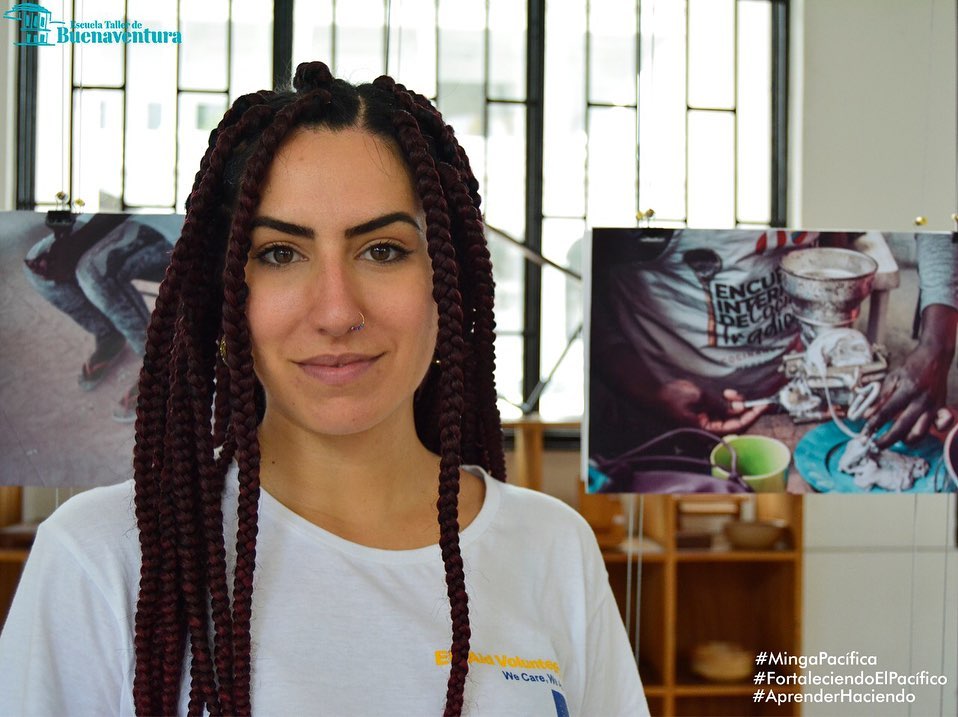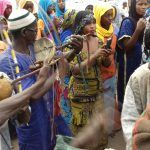Mauritania – Portrait of a human rights activist: Salimata Sy
Anna Duclos
In September 2018, I joined Alianza por la Solidaridad as a Senior EUAV on gender issues in Nouakchott, capital of Mauritania. As soon as I arrived, I had the opportunity to meet many of our partners who work for the rights of Mauritanian, and migrant, women and girls.
For some of them, the question of gender is vague, as in France for that matter – the country where I come from – but what is certain is that here it does not matter where we come from, if we are a woman in need we will find help. There are many civil society organizations, run by women and whose purpose is to promote the rights of women and girls, just to mention a few, l’Association des Femmes Chefs de Familles (AFCF), l’Association Mauritanienne pour la santé de la mère et de l’Enfant (AMSME), l’Association des Femmes Migrantes en Mauritanie (AFEMIMA) etc.
They provide legal aid, access to care, mediation, literacy, awareness of rights and health issues, assistance to victims of gender-based violence, advocacy, at the local, national or international level for some of them. They are numerous and complete each other. Together they try to answer the equally numerous problems: gender-based violence, early marriages, excision, trafficking in human beings, among others. Thanks to their mobilization and dedication, from one’s place or the other – for those who do not have headquarters – they make up for the lack of help from the responsible authorities or the inadequate or non-existent laws (report of the 5 September 2018 from Human Rights Watch (1)).
Among these organizations, one of the best known is the Association of Women Heads of Families (l’Association des Femmes Chefs de Familles – AFCF) – which originally wanted to be called the Association for the Promotion and Defense of Women’s Rights but to whom it was promptly asked to find a name, a little less provocative.
At the head of this organization, the illustrious Aminetou Mint Moctar, who was already portrayed by some of the biggest international NGOs (2). So I wanted to highlight her second by which I was fascinated from our first meeting, the Vice President of the AFCF, Salimata Sy. She managed to give me time despite a busy schedule. In a few days, she will leave for the United States, where she has been invited to visit six states as part of the «Women Leaders: Promoting Peace and Security» program.
During our interview, her phone rings often – people in need, organizations that seek her help for advocacy. She is available equally, for everyone.
In the Sy family, activism is a legacy. Parents, intellectuals committed to human rights, have always encouraged Salimata to be independent and autonomous. She has made her own reputation, her own place, without ever wanting to rely on the legacy of her father, a Mauritanian politician. She tells me an anecdote full of humor. When, as part of her trade union activities, she stood up to the people of the city where her father was mayor and encouraged them to vote for someone they believed in, to not hesitate to change the mayor if he did not meet their needs and expectations, leaving the inhabitants confused.
Passionate about biology, geology and research, Salimata Sy chooses to study the first one at the University of Rabat in Morocco then returns to Mauritania for her master’s degree. She will be quickly spotted by various laboratories, research centers, university professors, among others in Morocco and Switzerland.
As soon as she arrives in the workplace, she is confronted with a very masculine world, with senior researchers and employees who restrict her ambition and do not encourage her innovation, but she is also confronted with favoritism taking the form of scholarships awarded to the longest arms and not the most deserving.
If she has never been accustomed to ease, she experiences many inequalities based on gender. Although she is as competent as her male colleagues, she quickly understands that she is expected to keep the laboratory clean rather than to do actual research. She must constantly refuse the advances of her director who regularly tells her that sex will be her only way to change her career. This explains, in part, her rapid rapprochement with the youth movements of the CGTM (3) who contacted her at a time in her life when she most needed tools to fight injustices.
Her mother, a trade unionist, and Aminetou Moctar are at the origin of the AFCF and are present at the congress of the CGTM where the candidature of Salimata Sy was presented and encouraged by many trade union organizations. The two activists then propose to Salimata to join the AFCF. At the time everything remains to be created.
Thanks to the union that helped her to free herself from her commitments at the National Center for Livestock and Veterinary Research (CNERV) where her potential and ambition were not respected, and where she was already marginalized for trying to put In light of poor hygiene and research conditions, she can devote more time to her involvement in civil society.
Her mother falls ill and Salimata has to take over to relieve her of her family responsibilities. This forces her to put a brake on her plans and ambitions to pursue and excel in research. However, she continues her passionate union commitment, in which she quickly gains experience in the Confederal and Executive Office. There, she was trained in human rights in the workplace, among others by the sociologist and activist Sheikh Saad Bouh Camara.
A scholarship is granted to her to prepare a training course at the René Cassin Foundation – International Institute for Human Rights in Strasbourg where she obtains a general certificate.
But this whole journey has not been easy. Her path is strewn with pitfalls, she is sent to the field without preparation, without a car, she is asked to perform conferences in a language that she hardly speaks, with the aim each time to make her fail. The young woman has always surprised and be noticed all the more.
In 2004, as part of her trade union commitment, she was invited to meet the President of the Mauritanian Republic. At the time, she did not know the protocols, so she chose to participate silently until she realized that the unions served the president a fabricated reality. She therefore decides to express herself on the issues of her country, relying on the testimonies of people, close to her, in precarious situation, abandoned by the Mauritanian state.
«Mister President, you are at the end of your career,
Mauritania belongs to young people «
A year later, on August 3, 2005, President Taya was deposed by a coup organized by the army, through the Military Council for Justice and Democracy.
This meeting made her aware of the distance between her government and the reality of the country. This explains, among other things, her constant refusal to engage in politics, despite the insistence of youth movements to join their ranks.
During her first years at the AFCF, she did a lot of groundwork and accompaniment and then, as she went, excelled in advocacy and project management. She also, while working to support her family, piloted the first program of the AFCF funded by the European Union for civil society, the Support Program for Civil Society and Good Governance (PASOC).
When I ask her what her prospects are, she pauses. For the first time, I feel vulnerability. «The hazards of life led me to lose my strength». She tells me that she wants to step back, that she was sometimes disappointed, often disillusioned. She wonders if she has followed the right path to reach the «ideal of justice, transparency, governance» she had visualized. But she is aware of the road that remains to be traveled and this necessary retreat will allow her to regain her strength.
«I’m not entitled to failure, I have to continue.»
It is surely her demand towards herself and her country that brought her so far, that today she is so much asked to travel the world and to fight for the voiceless.
(1) “They Told Me to Keep Quiet”, Obstacles to Justice and Remedy for Sexual Assault Survivors in Mauritania. . Human Rights Watch. September 5, 2018. URL:
https://www.hrw.org/report/2018/09/05/they-told-me-keep-quiet/obstacles-justice-and-remedy-sexual-assault-survivors
(2) Aminetou Mint Moctar : La «rebelle» aux normes qui restreignent les femmes. Amnesty International. 16 mai 2017. URL: https://www.amnesty.org/fr/latest/campaigns/2017/05/aminetou-mint-moctar/
(3) The General Confederation of Workers of Mauritania is a national trade union center in Mauritania.













Dejar un comentario
¿Quieres unirte a la conversación?Siéntete libre de contribuir!